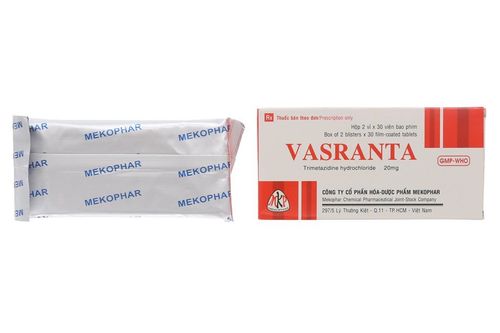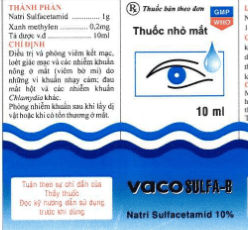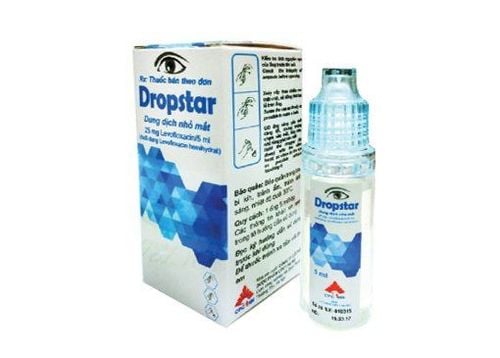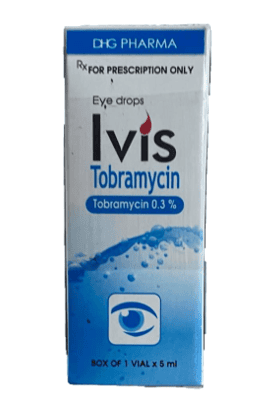This is an automatically translated article.
The thin cornea is the most vulnerable part of the eye area. Just coming into contact with dust, dirt, sand, or even the edge of a piece of paper can scratch or tear the cornea. So what should we do when we have a corneal abrasion?1. What is a corneal abrasion?
The cornea is a transparent structure located just in front of the iris of the eye. It has the role of protecting the eyes and helping to focus light. A corneal abrasion is when the cornea is hit by a scratch or cut.2. Causes of corneal abrasion
Contact with dirt, sand, sawdust, small pieces of metal, even the edges of paper can scratch or tear the cornea. Usually, when the scratch is shallow (on the surface) it is called a corneal scratch. In some cases, an infected scratch can lead to a very serious corneal ulcer. Corneal abrasions caused by plants (such as pine needles) can cause persistent inflammation in the eye called iritis.

Tiếp xúc với bụi bẩn, cát, mùn cưa, các mảnh kim loại nhỏ có thể gây xước hoặc rách giác mạc
3. How to recognize a scratched cornea?
The cornea is very sensitive, so scratching the cornea will often cause you quite a pain. It feels like a grain of sand or grit is in the eye. Your eyes may then be red, blurry, or watery. You will feel that even the light hurts your eyes. Some people also have a headache when they have a corneal abrasion.
4. What to do if a foreign object gets into the eye?
In case of corneal abrasion, you need to see a doctor promptly. Steps to treat corneal scratches you should do immediately after corneal scratches are:
Rinse eyes with clean water : Flush eyes with clean water or saline solution. (preferably with physiological saline solution if available). Using an eyewash cup or small, clean glass, place the edge of the cup against the eye socket bone. If your workplace has an eyewash facility, take advantage of it. Eye washes can remove foreign bodies from the eye.
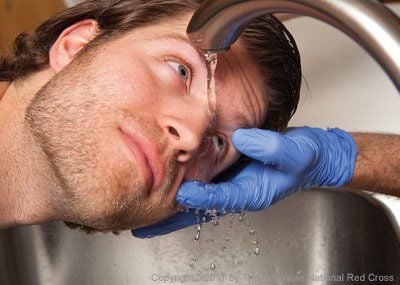
Cần rửa mắt bằng nước sạch khi bị bị trầy xước giác mạc
Blink several times : This move helps to remove small objects like dust or sand. Pulling the upper eyelid over the lower eyelid: The lower eyelid lashes can brush away foreign objects located on the lower surface of the upper eyelid. If you or someone around you see a foreign object on the white part of your eye, gently poke it out with a soft tissue or cotton swab. However, for foreign objects located right on the cornea (in front of the iris of the eye), you should not touch it because your movement may cause more serious corneal damage. See your doctor if you are unable to remove a foreign object from your eye on your own, or if you know there is a foreign object in your eye that you cannot pinpoint. Movements that can aggravate the injury
Pay attention to avoid the following movements that can aggravate the injury:
Do not try to remove a foreign object that has been inserted into the eyeball. Also avoid trying to remove a large object that makes it difficult to close the eye. Do not rub your eyes after an injury. Touching or pressing the eye can worsen corneal abrasions. Do not touch the eyeball with cotton swabs, tweezers or any other tool. This can aggravate corneal abrasions. Mild corneal abrasions usually resolve on their own within 24 to 48 hours.
5. How to treat corneal abrasions?
Your doctor will examine your eyes to evaluate for damage and to see if there are any foreign objects under your eyelids. An orange-yellow dye will be applied to your eye to help the doctor see the scratch. You may then be prescribed eye drops or ointments. Most minor scratches will heal within 1 to 3 days. You will probably need to come back for a follow-up visit the very next day.
If you are using contact lenses, you need to be especially careful because you have a higher risk of infection than other people. Your doctor will likely recommend that you stop wearing contact lenses for a few days, especially if the scratch is being treated with eye drops.
6. How to avoid scratching the cornea?
Wear safety goggles when you are around machines that create airborne debris (such as wood saws or compressed sandblasters).
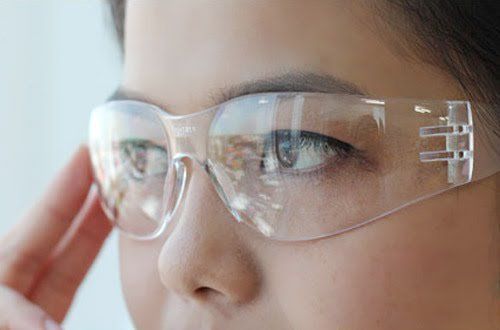
Đeo kính bảo hộ khi bạn ở gần các loại máy móc có chức năng tạo ra các mảnh vụn gỗ, kim loại
Cut nails short for adults, children and even infants. Cut low branches. Be careful when putting contact lenses in your eyes and need to make sure they are properly cleaned every day. Do not wear contact lenses while sleeping. The cornea can be scratched even during everyday activities. For example, playing sports, doing repairs in the house, walking on the road, or accidentally touching the cornea. Sometimes the cornea is also damaged by chemicals, household cleaners splash in the eyes...
With a team of leading experts and modern equipment, Vinmec International General Hospital is always the place to go. trust of customers in examining corneal pathologies as well as performing corneal transplantation in complicated corneal diseases. Corneal transplantation can be performed in patients of all ages to improve visual function.
Please dial HOTLINE for more information or register for an appointment HERE. Download MyVinmec app to make appointments faster and to manage your bookings easily.




